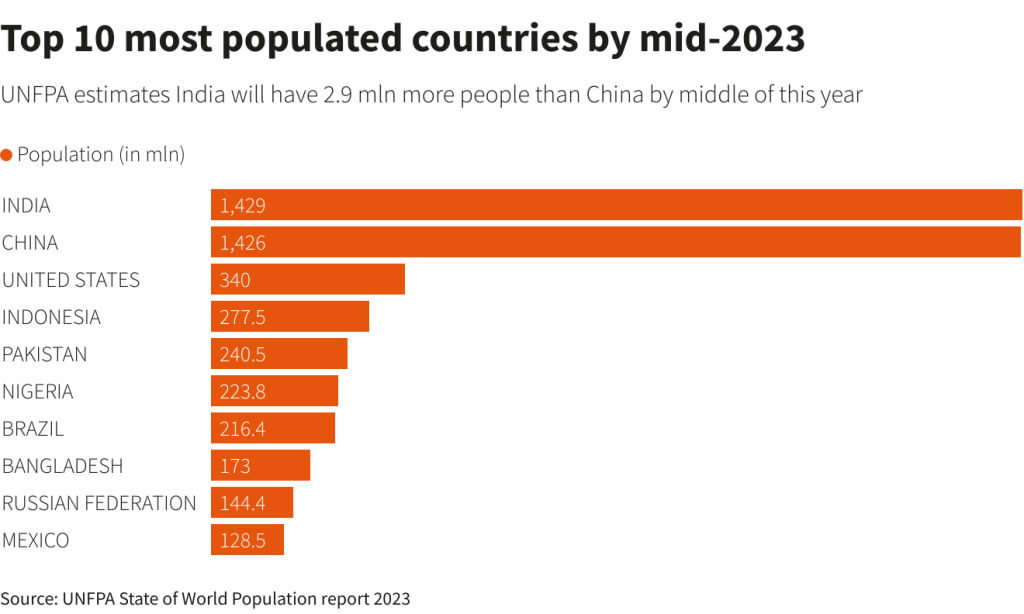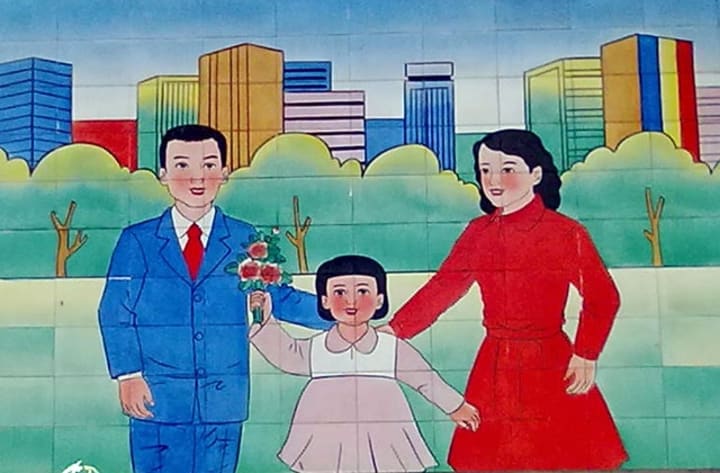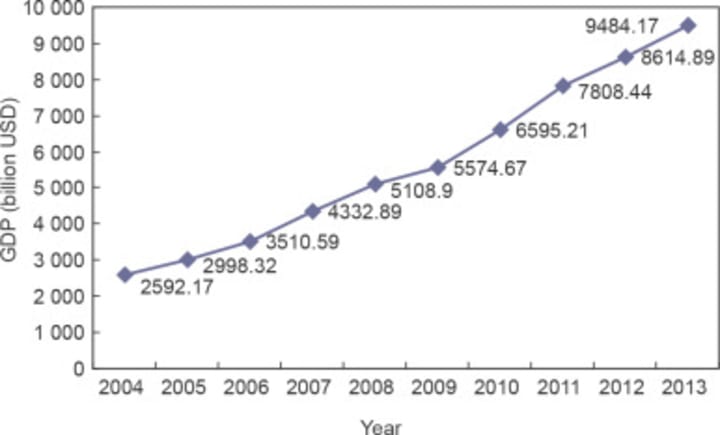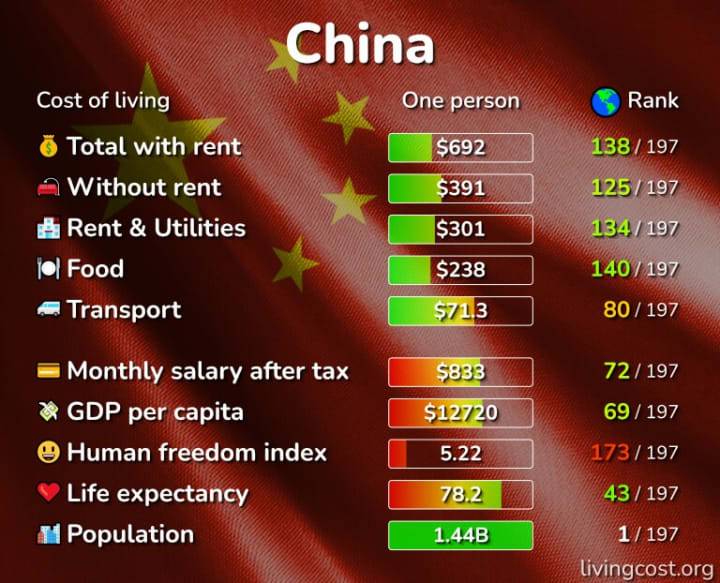China's Population: The Great Decline
Reasons for the decline

In the not-so-distant past, China was synonymous with a teeming sea of humanity. Its population, soaring to over a billion people, was an astonishing spectacle of human demographics. But times are changing, and the dragon's den is undergoing a fascinating transformation. China's population is decreasing, and the reasons behind this demographic shift are as intriguing as they are significant.In 2022, China experienced a historic demographic shift, as revealed by official Chinese State data. For the first time in over three centuries, China relinquished its title as the world's most populous country. This milestone also marked the initial population decline in more than six decades, a significant contrast to the steady growth observed since the tragic Great Chinese Famine of 1960-61, which resulted in the loss of tens of millions of lives. In 2022, China's population saw a decrease of approximately 850,000 individuals, signaling a trend set to persist for many decades to come, with annual decreases occurring.
1: The One-Child Policy Hangover

China's population decline can be traced back to one of the most well-known social experiments in history—the one-child policy. Enforced with an iron fist for over three decades, this policy had its intended effect: curbing the explosive population growth. But it also left a lingering legacy of demographic challenges.
For decades, Chinese families had been conditioned to embrace the one-child norm, leading to a shrinking birth rate. While the one-child policy was relaxed in 2015, allowing couples to have two children, the mindset shift toward smaller families had already taken root.
2: Economic Boom and Urbanization

The meteoric rise of China's economy over the past few decades is another factor behind the dwindling population. The allure of urban life and career opportunities has driven millions of Chinese from rural areas to bustling cities. This massive internal migration has led to delayed marriages and child-rearing decisions, contributing to the overall decline in the birth rate.
As careers and education become more important to young Chinese, the idea of starting a family takes a back seat. Balancing the demands of a competitive job market with parenthood becomes increasingly challenging.
3: The High Cost of Living

One of the most startling reasons for China's declining population is the high cost of living in urban areas. Skyrocketing housing prices, education expenses, and healthcare costs have made it financially burdensome to raise a family. Young couples often find themselves postponing or even forgoing parenthood altogether due to these financial pressures.
In China's major cities like Beijing, Shanghai, and Guangzhou, a single-bedroom apartment can cost a small fortune, and the cost of education can be staggering. The financial calculus of starting a family has become a daunting challenge, further contributing to the population decline.
4: The Marriage Dilemma

Traditional Chinese values regarding marriage are also changing. Marriage rates have been dropping as more young Chinese prioritize their personal and professional lives. In a society once characterized by early and arranged marriages, the idea of choosing a life partner for love and compatibility is gaining prominence.
Additionally, many young people are concerned about the challenges of finding the right partner. Gender imbalances due to the historical preference for male children, combined with the pressure to meet certain societal expectations, have made the marriage market highly competitive.
5: Aging Population and Labor Force Woes

China's population decline has significant implications for its aging demographic. With fewer young people entering the workforce and more elderly citizens to support, China faces potential economic challenges. The country's pension system and healthcare infrastructure may come under strain as the elderly population grows.
Furthermore, a shrinking labor force could threaten China's status as the world's factory, which has long relied on abundant cheap labor. The nation may need to adapt by investing in automation and technology to maintain its economic momentum.
6: Government Initiatives and Challenges

Recognizing the demographic crisis, the Chinese government has taken steps to encourage population growth. Measures such as offering incentives for larger families, extended parental leave, and enhanced childcare services have been introduced. These policies aim to change the cultural narrative around child-rearing and make it more feasible for families to have children.
However, changing long-standing demographic trends is no small feat. Cultural shifts take time, and the social and economic factors influencing China's declining population are deeply ingrained.
7: The Global Impact

The ripple effects of China's population decline extend beyond its borders. As the world's most populous country, this shift could have far-reaching consequences. It may lead to a decrease in the global demand for resources, a potential labor shortage in various industries, and changes in international trade dynamics.
Moreover, China's evolving demographic landscape could alter its position on the global stage. A smaller, aging population may influence the nation's foreign policy, economic strategies, and international partnerships in the years to come.
8: A Tale of Transformation

China's population decline is a story of transformation. From the days of the one-child policy to the current challenges of urbanization, economic pressures, and changing social norms, the demographics of the nation are evolving at a remarkable pace. The future of China lies in navigating these complexities and finding a balance between economic growth, individual aspirations, and family life.
As China grapples with its declining population, it remains a captivating case study in the ever-changing dynamics of society, economy, and culture. The dragon's den is rewriting its own story, and the world watches with bated breath to see how it unfolds.
About the Creator
Joshua Adebanjo
Hi there, I am Joshua, a writer who is hungry for Knowledge and also loves to share them and have other's insights. Subscribe and do not miss out on daily dose of Knowledge.
Enjoyed the story? Support the Creator.
Subscribe for free to receive all their stories in your feed. You could also pledge your support or give them a one-off tip, letting them know you appreciate their work.






Comments
There are no comments for this story
Be the first to respond and start the conversation.